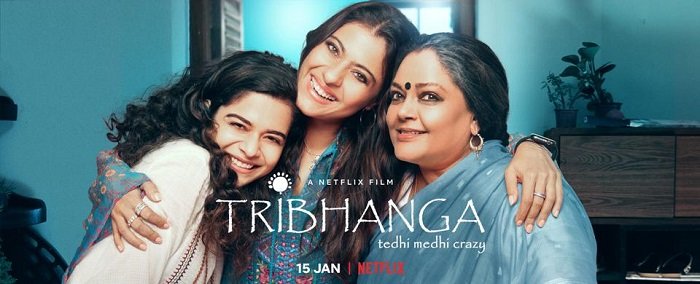Tribhanga

Ratings: 2/5
Duration: 01 Hr 35 Mins
Language: Hindi
Genre: Drama, Family
Director: Renuka Shahane
Writers: Renuka Shahane
Producers: Parag Desai, Ajay Devgn, Deepak Dhar, Sapna Malhotra, Siddartha P. Malhotra, Rishi Negi
Music: Sanjoy Chowdhury
Cinematography: Baba Azmi
Release Date: 15 January 2021 (India)
Released On: Netflix
Star Cast: Kajol, Kunaal Roy Kapur, Mithila Palkar, Tanvi Azmi, Manav Gohil, Vaibhav Tatwawaadi, Nishank Verma, Sweta Mehendale, Kanwaljeet Singh
Plot: Tribhanga is a story about a dysfunctional family with diverse life choices, especially three generations of women, and the conflicts that have been constant between them.
The story of mothers and daughters - Anu (Kajol) is a famous actor and dancer, with an even more accomplished writer mom Nayan (Tanvi Azmi), and a rather docile daughter Masha (Mithila Palkar).
It is when Nayan is on the death bed, Anu recalls their estranged relationship, and the can of worms is wide opened.
Review: Netflix’s new film, ‘Tribhanga’ doesn't exactly fit in the ‘Mother India’ mould, as in most mainstream Indian movies mothers are symbols of strength, solicitude, and sacrifice – who are ready to give up everything, if it means keeping the family together.
Though the intentions and the plot look good on paper, things didn't seem to come together, on the screen. Perhaps, the film tried too hard to capture various themes that never pauses to examine itself. In fact, it does not even stop for the audience to embrace a particular theme! In short, the direction lacked smooth transitions, therefore the emotional connection throughout the film went missing.
Since ‘Tribanga’ is a dance pose that refers to three bends in the body, this would lead the viewers to believe that the three protagonists might have an equal share in the story. However, the majority of the film is led by Kajol, but she wasn’t up to the mark. At places, she overdid her rudeness. Her delivery was way too exaggerated in some scenes and in places, where she needs to be emotional, she appeared to be too hard on herself. Imagine Anjali from Kabhi Khushi Kabhie Gham in her 50’s, that is Anu in Tribhanga!
Whereas, all the other actors slip effortlessly into their roles, though they were there for a limited time. Tanvi Azmi especially looked every bit the troubled old writer she plays. While, Mithila Palkar renders a mature performance and impresses with her balanced demeanour.
Others, including Manav Gohil and Vaibhav Tatwawaadi do justice to what is offered. Even Kunaal Roy Kapur is good. His role as the shuddh Hindi speaking biographer seems to be forced at places, yet it is fun to watch.
Daughter of the renowned writer Shanta Gokhale, director-writer Renuka Shahane adds her titbits by laying the story in a predominantly Maharashtrian set-up. However, the setup, the dialogues, and the visuals don’t seem to belong to this era. For instance, despite a very brief scene, the offensive bullying by teachers seemed like an unfair villainization of school teachers, though it plays a big part in pushing the plot forward. Also, it would have been alright if the characters didn’t approach modernity but unfortunately, the film seems to be stuck between the modern and the old ideas.
The film lacks moments of devastating silence that Renuka Shahane was able to create in her previous film Rita (2009) as a director, a thought-provoking Marathi film based on her mother’s acclaimed novel Rita Welinkar.
Nevertheless, it was absolutely refreshing to see the spotlight on the internal struggles of women who choose a different life for themselves. The theme of sexual abuse is handled sensitively yet done in a way to convey the heinous nature of the crime and the devastating impact it can have on the victim’s life.
Overall, depth takes the backseat in ‘Tribhanga’ as the idea of stuffing too much in a short time fades the beats, and results in things managing to make points just on the surface. But at heart, it deals with a dilemma that continues to plague women. What is better? Being defined by society’s expectations for you, or having the freedom to make your choices, even if they turn out to be wrong?















































